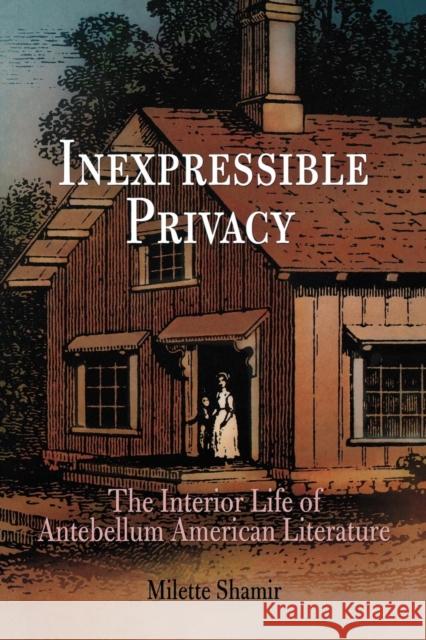Inexpressible Privacy: The Interior Life of Antebellum American Literature » książka
Inexpressible Privacy: The Interior Life of Antebellum American Literature
ISBN-13: 9780812220230 / Angielski / Miękka / 2008 / 296 str.
Inexpressible Privacy: The Interior Life of Antebellum American Literature
ISBN-13: 9780812220230 / Angielski / Miękka / 2008 / 296 str.
(netto: 111,22 VAT: 5%)
Najniższa cena z 30 dni: 111,00
ok. 30 dni roboczych
Bez gwarancji dostawy przed świętami
Darmowa dostawa!
Inexpressible Privacy The Interior Life of Antebellum American Literature Milette Shamir "Shamir dismantles the link that has been forged by cultural historians and literary critics between domesticity and privacy."--American Historical Review "Shamir contributes centrally to historicist studies of feminine and masculine subjectivity and the unevenly gender-freighted practices of privacy and intimacy. The book will be noted for the large sweep of its argument about the creation of masculine privacy, as well as for the small details of its readings. Cogently argued, immediately relevant to American studies scholarship in a variety of directions, Inexpressible Privacy is extraordinarily topical and innovative."--Dana D. Nelson, Vanderbilt University "In what is easily one of the best works of literary and social criticism this reviewer has read in years, Shamir explores the inherent contradictions in the American 'cult of privacy, ' tracing the obsession back to the decades before the Civil War. . . . Extraordinarily well written and researched, this volume confronts key gender questions. . . . Essential."--Choice "Shamir's arguments are very persuasive, and she surveys an expansive cross-disciplinary range of writings on privacy--a great boon to those interested in the subject."--Journal of American History Selected by Choice magazine as an Outstanding Academic Title for 2006 Few concepts are more widely discussed or more passionately invoked in American public culture than that of privacy. What these discussions have lacked, however, is a historically informed sense of privacy's genealogy in U.S. culture. Now, Milette Shamir traces this peculiarly American obsession back to the middle decades of the nineteenth century, when our modern understanding of privacy took hold. Shamir explores how various discourses, as well as changes in the built environment, worked in tandem to seal, regulate, and sanctify private spaces, both domestic and subjective. She offers revelatory readings of texts by Nathaniel Hawthorne, Frederick Douglass, Herman Melville, Harriet Beecher Stowe, Henry David Thoreau, and other, less familiar antebellum writers and looks to a wide array of sources, including architectural blueprints for private homes, legal cases in which a "right to privacy" supplements and exceeds property rights, examples of political rhetoric vaunting the sacred inviolability of personal privacy, and conduct manuals prescribing new codes of behavior to protect against intrusion. Milette Shamir is Senior Lecturer in American Literature at Tel Aviv University. 2005 296 pages 6 x 9 8 illus. ISBN 978-0-8122-3906-5 Cloth $65.00s 42.50 ISBN 978-0-8122-2023-0 Paper $22.50s 15.00 ISBN 978-0-8122-0424-7 Ebook $22.50s 15.00 World Rights Literature Short copy: Few concepts are more widely discussed or more passionately invoked in American public culture than the concept of privacy. Milette Shamir traces the peculiarly American obsession with privacy back to the middle decades of the nineteenth century, when our modern understanding of the concept took hold.
Inexpressible PrivacyThe Interior Life of Antebellum American LiteratureMilette Shamir"Shamir dismantles the link that has been forged by cultural historians and literary critics between domesticity and privacy."--American Historical Review"Shamir contributes centrally to historicist studies of feminine and masculine subjectivity and the unevenly gender-freighted practices of privacy and intimacy. The book will be noted for the large sweep of its argument about the creation of masculine privacy, as well as for the small details of its readings. Cogently argued, immediately relevant to American studies scholarship in a variety of directions, Inexpressible Privacy is extraordinarily topical and innovative."--Dana D. Nelson, Vanderbilt University"In what is easily one of the best works of literary and social criticism this reviewer has read in years, Shamir explores the inherent contradictions in the American 'cult of privacy,' tracing the obsession back to the decades before the Civil War. . . . Extraordinarily well written and researched, this volume confronts key gender questions. . . . Essential."--Choice"Shamir's arguments are very persuasive, and she surveys an expansive cross-disciplinary range of writings on privacy--a great boon to those interested in the subject."--Journal of American HistorySelected by Choice magazine as an Outstanding Academic Title for 2006Few concepts are more widely discussed or more passionately invoked in American public culture than that of privacy. What these discussions have lacked, however, is a historically informed sense of privacy's genealogy in U.S. culture. Now, Milette Shamir traces this peculiarly American obsession back to the middle decades of the nineteenth century, when our modern understanding of privacy took hold.Shamir explores how various discourses, as well as changes in the built environment, worked in tandem to seal, regulate, and sanctify private spaces, both domestic and subjective. She offers revelatory readings of texts by Nathaniel Hawthorne, Frederick Douglass, Herman Melville, Harriet Beecher Stowe, Henry David Thoreau, and other, less familiar antebellum writers and looks to a wide array of sources, including architectural blueprints for private homes, legal cases in which a "right to privacy" supplements and exceeds property rights, examples of political rhetoric vaunting the sacred inviolability of personal privacy, and conduct manuals prescribing new codes of behavior to protect against intrusion.Milette Shamir is Senior Lecturer in American Literature at Tel Aviv University.2005 | 296 pages | 6 x 9 | 8 illus.ISBN 978-0-8122-3906-5 | Cloth | $65.00s | L42.50 ISBN 978-0-8122-2023-0 | Paper | $22.50s | L15.00 ISBN 978-0-8122-0424-7 | Ebook | $22.50s | L15.00 World Rights | LiteratureShort copy:Few concepts are more widely discussed or more passionately invoked in American public culture than the concept of privacy. Milette Shamir traces the peculiarly American obsession with privacy back to the middle decades of the nineteenth century, when our modern understanding of the concept took hold.











